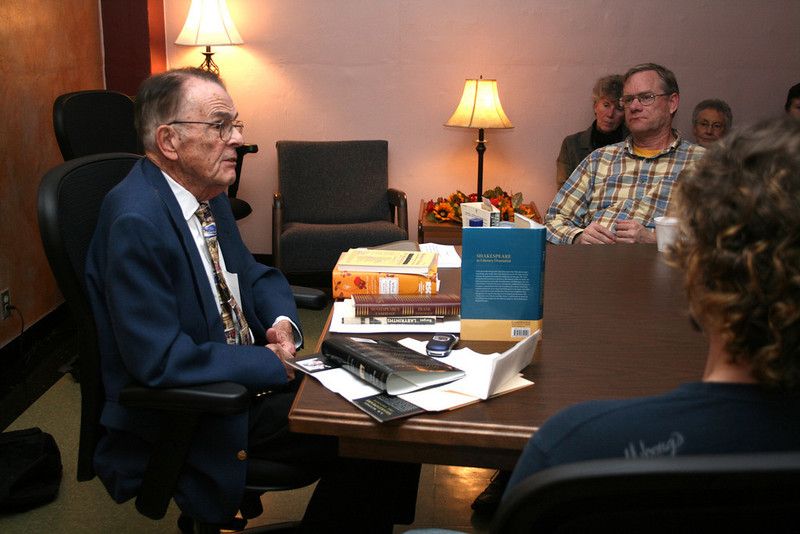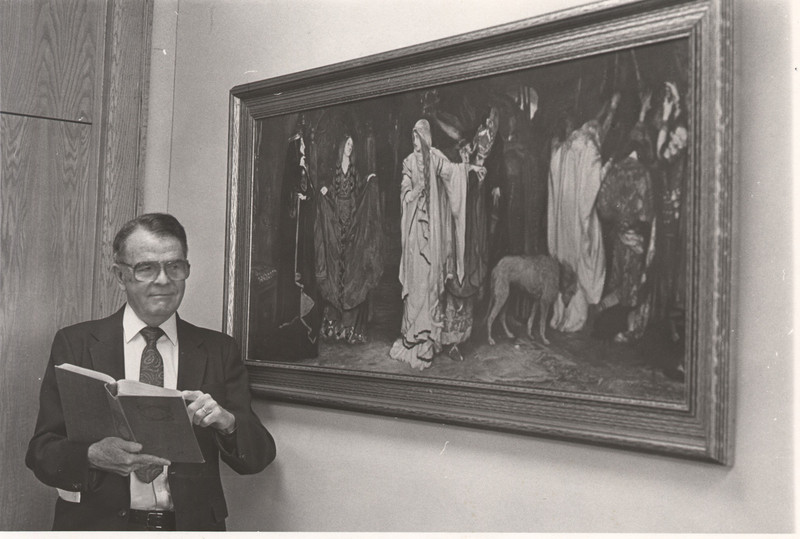Dorset Graves shared passion for literature

Of all the faculty members who have been associated with Chadron State College the past 101 years, perhaps no one enjoyed his or her work more than Dorset Graves.
Collecting books and reading them were his passions. He once noted that being a college professor was perfect for him. He could read all he wanted, pass the knowledge he had gained on to his students and be paid for it.
After he had ended his 32-year career on the faculty in 1990, he continued to serve as an adjunct, or part-time faculty member, for 15 more years. He often said he would teach Shakespeare without being paid.
Besides teaching, he was chairman of the Division of Language and Literature for 29 year.
Graves died at age 87 last Saturday evening, Sept. 1, at Crest View Care Center, where he had resided the past two months after breaking his hip. Survivors include his wife Meredith, two sons and six grandchildren.
His wife noted, “Dorset loved teaching and was proud that the members of his department always seemed to have a harmonious relationship.”
Several of his colleagues have given glowing testimonies about the admiration they had for their long-time friend and mentor.
Graves had never heard of Chadron State when he received a telegram from Dr. Barton Kline, then the college’s president, asking that he apply for an opening in the English Department.
Kline had been traveling through Iowa and stopped at Grinnell College to see if it had any alumni who were working on graduate degrees. Graves was studying for his doctorate at Duke University in North Carolina, and was given such a high recommendation by Grinnell personnel that he was immediately offered an associate professorship at Chadron State.
When the telegram arrived, Graves and his wife used a road map to find Chadron. He also responded by telegram, exchanged a few letters and in about two weeks agreed to join the faculty the following fall, in 1958.
Graves had a lifelong affection for books and reading. Through the years, he undoubtedly checked out several times more books from the CSC Library than anyone else, often borrowing at least a half dozen at a time. In 2006, the library named its weekly lecture series in his honor.
While giving the lecture series program the following year, he recalled that when he was 10 or 11 years old he was rummaging through the attic of his grandmother’s two-story farm home in east-central Missouri and discovered a battered copy of Shakespeare’s works.
He was particularly fascinated with “Romeo and Juliet” after seeing a movie about the tragic romance.
“I wasn’t a child prodigy. I didn’t pick it up right away. It took me quite a while, but I was determined,” he explained.
As a seventh grader, he approached the junior high principal and offered to rewrite the play “so everyone can understand it” and to lead his classmates in producing the play.
Graves said the principal was horrified, noting that Romeo and Juliet wasn’t the kind of play young teens should read, much less perform.
Despite the setback, Graves’s love for Shakespeare continued to flourish. Before long, he had memorized three speeches from the classic works.
Soon after graduating from Wellsville High School in Missouri in 1943, Graves joined the Navy. While stationed near San Francisco, he purchased a thick volume of Shakespearean works for $2.98. He served aboard troop transport ships that made six round trips across the Pacific during World War II. His duties as a gunnery captain’s communications assistant placed him beside a 16-inch gun on the ship’s fantail. During long periods of inactivity, he read all the plays and some of his favorites more than once.
After the war ended, Graves enrolled at Grinnell College. Highlights there included meeting Meredith Miler of Mason City, Iowa, his eventual wife, and author Robert Frost. The latter revealed during his second visit to the Iowa college that he had read one of Graves’s poems to a group at Harvard.
After graduating in 1950, Graves moved to New York City, where he spent one year as a railroad dispatcher for Snow Crop Frozen Foods and the next year teaching at Hicksville High School on Long Island.
While living in New York, the couple was married on June 21, 1951.
After earning his master’s degree from Duke in 1954, he taught English at Idaho State College at Pocatello for two years before returning to Duke to work on his doctorate.
His highlights at Chadron State included receiving a national outstanding teaching award in 1972, helping CSC become the first state college to develop an integrated humanities curriculum in the mid-1960s and taking over the philosophy courses in 1972.
Graves was proud of his department at CSC.
“We’ve been fortunate in getting well-trained, intelligent and stimulating personnel,” he said during an interview when he stepped down as a full-time professor in 1990. “They’re ‘state of the art’ people who love their discipline and communicate that love with compelling verve.”
Two of Graves’s students became CSC English professors after they had earned their doctorates. Both say they are grateful to Graves for helping them discover the joys of language and literature.
One of them, Dr. Bob McEwen, said he had “an undying, life-long gratitude for this man” and frequently had Graves read and correct the punctuation in poetry he wrote.
The other, Dr. Michael Cartwright, said Graves was his inspiration as he chose a career in teaching literature and called his mentor “a stellar lecturer, ingenious inquisitor and congenial, but demanding, taskmaster.”
Another long-time member of the department at CSC, Dr. Walt Scholl, called Graves “a great person who was unique in many ways. Few have the intellectual capacity that he possessed.”
Dr. George Griffith, who succeeded Graves as head of Language and Literature at CSC, said Graves was an outstanding scholar with a tremendous understanding of 19th century American literature, as well as Shakespeare. Griffith said they had an extremely cordial relationship.
Griffith recalls that Graves personally purchased books through a wholesaler which normally did not sell to individuals.
“I was always amazed how many boxes of books he received at the college and the many books he had collected,” Griffith said.
When Graves finally quit teaching in 2005, he rented an apartment to store the books he had kept at his office at CSC. There was no more space left for them at his home.
After the family had conferred with college officials, between 3,000 and 3,500 books that were stored in the apartment were donated to the Chadron State Library in July. That was about half of the collection.
Both of the Graves brothers, Chris, who lives in Pocomoke City, Md., and Mark, of Chadron, and three grandchildren moved the books.
“Books were Dad’s love,” said Mark. “Whenever we went on vacation, we always stopped at used book stores and bought some more. I seldom saw him when he didn’t have a book in his hand.”
Although extremely friendly, Graves also was a rather private person and requested that no memorial services be held for him.
Category: Campus News, English

